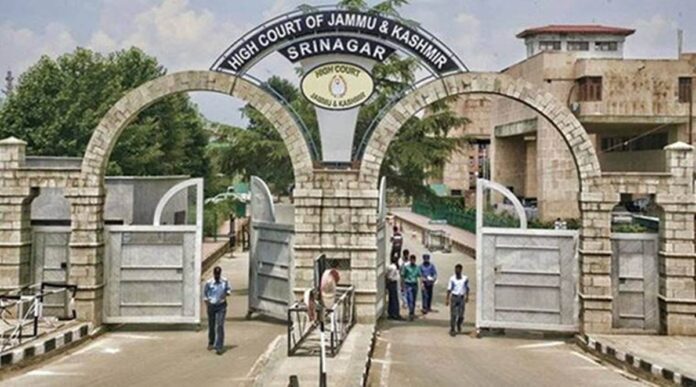Disputed question of facts is not a matter to be entertained before the High Court:
In a recent verdict by the Jammu and Kashmir High Court, it has declined to hear the plea challenging the house arrest of Farooq Abdullah by the State. The plea was filed by the kins of the former Chief Minister of the erstwhile State of Jammu and Kashmir, Muzafar Ahmed Shah, Begum Khalid Shaha and Dr Mustaffa Kamal. The petition was placed before Justice Ali Mohammad Magrey.
The reason, as stated in the court order for the rejection of the pleas is that the petition puts forth a case which involves a question of fact and thus cannot be maintained before the High Court. By the order passed rejecting the plea, the Court had clarified that it is neither empowered to hold enquiries into the allegations put forth in a plea or appreciate oral evidence. It has re-iterated the law of the land that writ proceedings are generally of nature where there are no abstract facts, but rather is supported and substantiated by authentic documentary evidence, before the High Court.
The plea alleging ‘unlawful detention’ by the State:
The allegations as set out in the plea is that they were unlawfully detained in their houses since September 05. In arguments, the State countered the ‘unlawful detention’ by producing a communication as received from the Additional Deputy Commissioner, which discloses that the liberty of the petitioner was not being curbed and they were not detained at the said duration. The case helped tightly from both ends.

The counsel appearing on behalf of the petitioners argued that the facts as alleged in the petition could be substantiated by way of newspaper clippings, proving beyond doubt that the petitioners were in-fact placed under house arrest. However, the Court did not appreciate press clippings as a piece of reliable evidence. It said that these could not be relied upon ‘as authentic documentary evidence’ while saying that a writ court cannot appreciate evidence in relation to disputed facts.
‘Free to take recourse of appropriate legal remedy available’, says J&K HC:
Among the many reasons for rejecting the pleas, the Court stated that disputed facts directly impair the maintainability of any petition before the Court. It said in situations as such, the only option available is to order for a dismissal of the said writ petition and advising the parties involved to take a ‘recourse to appropriate remedy’. However, with the order, the judge had set the parties on liberty to pursue other appropriate legal remedies, as available to them under law. The court order read
“In light of the above, this petition is dismissed, as being not maintainable and unnecessary, leaving the petitioner free to take appropriate remedy available to him under law before an appropriate forum.“
Detention of Farooq Abdullah under PSA extended by three months:
It is believed that the petitioners were placed under house arrest and detained by the State for having close personal relations with Farooq Abdullah. Farooq Abdullah, former Chief Minister of Jammu and Kashmir, himself has been placed under house arrest since August 05, when the centre decided to abrogate Article 370 of the Constitution. The aftermath of August 05 has seen a lot of mayhem in the State as well as nation-wide. It was much later on September 15 that the State declared imposition of the Public Safety Act (PSA) on Farooq Abdullah.

Consequently, a Habeas Corpus petition was filed before the Supreme Court for producing Farooq by MDMK Leader and Rajya Sabha Member, Vaiko. However, the same was rejected by the Court because of the imposition of the Public Safety Act. In fact, it is seen that the invoking of the provisions of the Public Safety Act by the State was done with an intention to block any further progress of the petition, tying the hands of the Supreme Court. Therefore the Supreme Court, headed by the CJI Ranjan Gogoi, was left with little choice, but reject the petition of Vaiko directing it to ‘appropriate authority’.
The Public Safety Act is seen as a draconian and archaic legal framework. The provisions of the statute are sure to have adverse effects on the life and liberty of the citizens of the country. The provisions of the said Act, in original, allows the State to detain any person above the age of sixteen for trial without two years. However, in an amendment brought to the Act in 2018, the age bar was raised to eighteen-years.

The provisions are often attacked and condemned to be against the principles of Natural Justice and Rule of Law. Previously, the said Act was used against terrorists, separatists as well as stone-throwers. It is the first time an MP and former Chief Minister is detained under the provisions of this Act. Apart from Abdullah, his son Omar and Mehbooba Mufti have also been placed under house arrest.
In a recent turnout of events, the detention period for Abdullah has been extended by three months by the PSA advisory board. As per the scheme of the Act, initially, a person is to be detained for 12 days. Any detention beyond three months’ time period is first to be ratified by the Advisory Board constituted under the PSA. The present advisory board under PSA consisted of former judge of the Jammu and Kashmir High Court, Janak Raj Kotwal. As disclosed, there are a total of twenty-seven charges against the former Chief Minister, including three FIRs and sixteen diary entries. These charges include violation of freedom of speech by inciting violence and misusing political position for inciting secessionist ideology.

